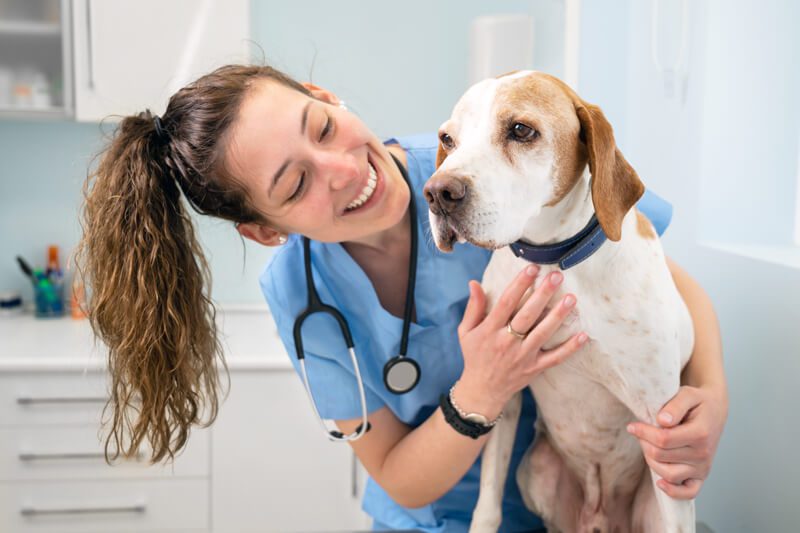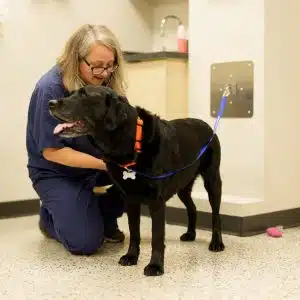Veterinary Oncology Services overview for pet owners facing cancer diagnoses
Comprehensive Overview to the Providers Supplied by a Vet Oncologist
Veterinary oncology incorporates a vast variety of services targeted at treating and identifying cancer in pet dogs. Veterinary Cancer Specialist. Oncologists employ advanced diagnostic methods and use different treatment choices tailored per pet's demands. They additionally prioritize encouraging care and provide beneficial sources for family pet owners. Recognizing these services is important for making informed decisions. What specific facets of vet oncology can notably impact a family pet's treatment trip?
Recognizing Veterinary Oncology
Veterinary oncology is a specialized area focused on dealing with and identifying cancer cells in pets. This discipline includes a variety of techniques, from clinical therapies such as radiation treatment and immunotherapy to medical interventions aimed at eliminating growths. Vet oncologists are trained to identify the one-of-a-kind symptoms of cancer in various types, enabling them to tailor therapy strategies to specific people.
Along with typical treatments, vet oncology highlights helpful care, which plays an essential duty in boosting the high quality of life for affected animals. This consists of pain administration, nutritional support, and palliative care alternatives. Partnership with animal proprietors is vital, as they are integral to decision-making concerning their animals' therapy courses. As research study breakthroughs, vet oncology proceeds to progress, using brand-new hope and improved outcomes for pet dogs diagnosed with cancer cells. Overall, this field is fundamental for resolving the complexities of cancer cells in buddy pets.
Advanced Diagnostic Techniques
Advanced diagnostic strategies play a necessary duty in veterinary oncology, giving essential insights right into the presence and extent of cancer in animals. Imaging techniques such as ultrasound, CT scans, and MRI are commonly employed to picture tumors and examine their attributes. Additionally, biopsy procedures are necessary for acquiring cells samples, enabling conclusive diagnosis and tailored treatment plans.
Imaging Modalities Utilized
Imaging modalities play a necessary role in the medical diagnosis and management of cancer in pets. Vet oncologists utilize numerous sophisticated imaging methods to assess tumor dimension, existence, and metastasis. Radiography, or X-rays, provides a preliminary sight of bone and upper body problems, while ultrasound provides real-time imaging of soft cells, permitting thorough evaluation of internal organs. Computed tomography (CT) boosts visualization of complicated physiological frameworks and allows 3D reconstructions, assisting in exact lump localization. Magnetic resonance imaging (MRI) is invaluable for soft tissue distinction, particularly in mind lumps. Furthermore, nuclear medicine methods such as positron discharge tomography (ANIMAL) assistance determine metabolic activity within lumps. Jointly, these techniques enhance analysis accuracy, directing reliable treatment approaches for oncological clients.
Biopsy Procedures Clarified
Complying with the preliminary assessment with imaging techniques, obtaining a clear-cut medical diagnosis commonly requires cells tasting through biopsy procedures. Veterinary oncologists use various biopsy strategies based upon the lump's area and characteristics. Fine needle desire (FNA) is a minimally invasive method that extracts cells for cytological evaluation, perfect for superficial masses. Core needle biopsies offer larger cells examples and work for much deeper growths, permitting histopathological evaluation. Surgical biopsies include excising a part or the entire tumor, facilitating complete assessment. These procedures not only verify the visibility of cancer cells however additionally aid identify its kind and grade, assisting treatment choices. Each biopsy method is chosen meticulously to stabilize analysis accuracy with individual security and comfort.
Treatment Options for Cancer Cells in Pet dogs
When a pet dog is detected with cancer cells, a selection of treatment alternatives come to be available to assist manage the condition and enhance high quality of life. Veterinary oncologists typically suggest a multidisciplinary method tailored to the individual pet's needs, which might consist of surgical procedure, radiation therapy, immunotherapy, or different treatments.
Surgical procedure is typically used to eliminate tumors and damaged tissues, possibly causing total remission sometimes. Radiation therapy intends to ruin and target cancer cells, lowering tumor size and alleviating signs and symptoms - Veterinary Cancer Specialist. Immunotherapy uses the animal's body immune system to combat cancer cells better, while alternate treatments could include acupuncture or natural supplements to sustain total health and wellness
Each therapy alternative carries its very own benefits and risks, and vet oncologists function very closely with animal proprietors to design a complete plan that straightens with the animal's details medical diagnosis and the owner's dreams. The best objective is to enhance the family pet's convenience and lifestyle throughout their cancer journey.
Chemotherapy for Animals
Chemotherapy is a typical therapy alternative for family pets detected with cancer cells and is typically made use of along with various other treatments detailed by veterinary oncologists. This therapy entails the management of particular drugs made to ruin and target cancer cells, therefore reducing tumor dimension and protecting against the spread of the illness. Veterinary oncologists customize radiation treatment procedures based upon the sort of cancer, the pet's total health and wellness, and the preferred treatment outcome.
Negative effects can take place, as these medicines might also affect healthy cells. Common responses include nausea, throwing up, and momentary modifications in cravings - Pet Cancer Surgery. Veterinary oncologists are geared up to handle these negative effects properly, making sure the pet's comfort throughout the treatment process. Regular tracking via blood tests and follow-up appointments is vital to assess the animal's feedback to chemotherapy and make required adjustments. Inevitably, chemotherapy can provide significant benefits, enhancing the lifestyle for pet dogs facing cancer cells try this site medical diagnoses

Radiation Treatment in Veterinary Medicine
Radiation therapy serves as an efficient therapy option for pets diagnosed with localized lumps, offering a targeted strategy to cancer cells management. This technique utilizes high-energy radiation to harm the DNA of cancer cells, hindering their capability to multiply. It is particularly valuable for tumors that are not open to medical elimination or for cases where surgical treatment might not be feasible because of the tumor's location.
Veterinary oncologists customize radiation methods based upon lump location, size, and type, along with the family pet's total health. Therapy can be delivered using outside beam radiation or brachytherapy, each with distinctive advantages. Usually, multiple sessions are required to take full advantage of performance while minimizing negative effects.
Pets may experience temporary reactions such as skin irritability, the general purpose is to reduce lumps and minimize signs, inevitably enhancing the family pet's diagnosis and top quality of life. As necessary, radiation therapy plays an essential function in complete cancer cells care.
Palliative Care and Top Quality of Life
Palliative care in vet oncology concentrates on enhancing the lifestyle for pet dogs encountering terminal illnesses, guaranteeing comfort and dignity in their final days. This customized method prioritizes pain administration, signs and symptom control, and psychological support. Veterinary oncologists analyze each pet's individual demands, tailoring interventions to alleviate discomfort and boost general well-being.
Techniques may include administering medications for discomfort relief, taking care of queasiness, and dealing with other stressful signs. In addition, dietary support is commonly offered to preserve stamina and boost cravings. The emotional element of palliative care is just as important; developing a tranquil atmosphere aids decrease stress and anxiety for both animal and owner.
Inevitably, the goal of palliative treatment is to permit pets to enjoy their staying time with as much happiness and dignity as possible. By focusing on convenience and lifestyle, vet oncologists play a vital function in guaranteeing that pet dogs and their households browse this difficult journey with concern and understanding.
Support for Pet Owners During Treatment

Psychological Assistance for Owners
Charting the psychological landscape during a pet dog's cancer treatment can be an overwhelming experience for owners. The unpredictability bordering medical diagnosis and prognosis can cause sensations of anxiety, helplessness, and unhappiness. Veterinary oncologists recognize the significance of psychological assistance and usually provide assistance to aid proprietors browse this difficult trip. Communication is crucial; discussing treatment alternatives and prospective results can minimize some concerns. Furthermore, supplying peace of mind that psychological actions stand fosters an encouraging setting. Several oncology centers may additionally recommend support groups or counseling solutions customized for pet owners, helping with common experiences. Motivating owners to focus on self-care during this time is important, as their psychological well-being directly affects their animal's comfort and overall therapy experience.

Resources and Educational Products
Guiding via the intricacies of a pet's cancer cells therapy can be intimidating for owners, making accessibility to educational products and trusted sources important. Vet oncologists frequently give a selection of handouts, brochures, and online materials that explain treatment choices, potential adverse effects, and treatment techniques. These sources aid empower and debunk the process animal proprietors to make informed decisions. Furthermore, numerous oncology centers offer access to sustain teams and forums where owners can link with others dealing with similar challenges, promoting a feeling of area. Educational workshops and webinars conducted by More Info vet specialists even more enhance understanding, making sure that proprietors are fully equipped to navigate their animal's journey via cancer cells therapy with confidence and understanding.
Often Asked Concerns
How Can I Prepare My Pet for a Vet Oncology See?
Preparing a pet dog for a veterinary oncology browse through includes gathering clinical documents, noting signs, and ensuring the pet dog is comfy. A calm demeanor and acquainted items can aid alleviate anxiety throughout the appointment.
What Are the Indications My Animal May Have Cancer?
Indicators that a pet may have cancer cells include inexplicable weight-loss, consistent vomiting or looseness of the bowels, uncommon swellings or swellings, lethargy, changes in appetite, difficulty breathing, and changes in actions. Motivate vet attention is essential.
Just How Can I Assistance My Pet Dog Emotionally Throughout Treatment?
Supporting a pet dog emotionally throughout treatment entails giving convenience, maintaining regimens, supplying gentle love, and guaranteeing a calm setting. Taking part in peaceful play and normal friendship helps reduce stress and anxiety and fosters a complacency.
Are There Different Therapies for Pets With Cancer?
Alternate therapies for pets with cancer include acupuncture, organic therapies, and dietary assistance. These techniques may complement traditional treatments, promoting general well-being. Consulting with a veterinarian is vital for risk-free and efficient combination of alternate therapies.
What Costs Should I Anticipate for Vet Oncology Services?
The expected expenses Website for veterinary oncology services can differ considerably, often affected by diagnostics, therapies, and ongoing treatment. Pet proprietors ought to get ready for costs varying from examinations to specialized therapies, reflecting the complexity of cancer management.
Collaboration with pet owners is crucial, as they are integral to decision-making regarding their pets' treatment courses. Each treatment option carries its very own advantages and risks, and veterinary oncologists work carefully with pet owners to design a complete plan that straightens with the family pet's certain medical diagnosis and the owner's wishes. Family pets may experience short-lived reactions such as skin irritability, the total purpose is to shrink lumps and ease symptoms, inevitably enhancing the pet's prognosis and high quality of life. Assistance for animal owners during treatment is vital in steering with the emotional obstacles linked with a pet's cancer cells medical diagnosis. Preparing a family pet for a vet oncology go to involves gathering medical records, keeping in mind signs and symptoms, and ensuring the pet is comfortable.